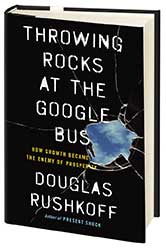Future Now
The IFTF Blog
Douglas Rushkoff joins IFTF as Research Fellow
 We're thrilled to announce that media theorist, author, and professor Douglas Rushkoff has joined Institute for the Future as a Research Fellow. Douglas is a professor of Media Theory and Digital Economics at CUNY/Queens and author of more than a dozen bestselling books about media, technology, and culture, including Program or Be Programmed, Present Shock, Media Virus, and his latest, Throwing Rocks at the Google Bus: How Growth Became the Enemy of Prosperity. Douglas is a master at seeing and explaining cultural shifts as they are emerging and connecting the dots across economics, business, politics, and our daily lives. Through all of his work, he advocates for the use of technology to empower people and enrich our humanity, not tomorrow but today.
We're thrilled to announce that media theorist, author, and professor Douglas Rushkoff has joined Institute for the Future as a Research Fellow. Douglas is a professor of Media Theory and Digital Economics at CUNY/Queens and author of more than a dozen bestselling books about media, technology, and culture, including Program or Be Programmed, Present Shock, Media Virus, and his latest, Throwing Rocks at the Google Bus: How Growth Became the Enemy of Prosperity. Douglas is a master at seeing and explaining cultural shifts as they are emerging and connecting the dots across economics, business, politics, and our daily lives. Through all of his work, he advocates for the use of technology to empower people and enrich our humanity, not tomorrow but today.
Douglas writes:
I’ve been collaborating with members of IFTF over the past two decades. It’s playful as can be, but it’s not safe. Our conversations, interactions, and interventions have challenged my underlying assumptions about our world and what we can do—if anything—to make it sustainable, resilient, and just.
But the occasional session at a workshop or impromptu discussion in a conference green room are really not up to the task of securing social, environmental, and economic justice for future generations. That’s why I’m delighted to make our relationship more formal by becoming a Research Fellow at Institute for the Future.
I’m no futurist. If anything, I’ve argued that the majority of futurism takes the form of visionary propaganda—the TED-talky, instant-update techno-solutionism that sells startup stock shares a whole lot better than it empowers people to choose our own adventure. The rest of futurism seems optimized to make the world more dependent on futurist consultants capable of forecasting the scenarios to which organizations, governments, and companies will have to adapt.
That’s not the kind of futurism I believe in, and luckily it’s not the kind they—or I should say we—do at IFTF.
The future is not a scenario we should prepare for, but a process we enact in the present. It’s not a fate we discern, but an extension of our actions in the moment—be they personal, cultural, or institutional. If anything, when the future seems inevitable or out of control, it’s simply because we have not yet unearthed the embedded assumptions informing our highly determinative actions.
Whether helping empower an international network of investigative journalists to uncover a global money-laundering conspiracy, helping cities reclaim their economic power at the end of the industrial age, or teaching corporations that it’s more profitable to circulate value than to extract it, my friends at IFTF have been at the frontlines of change-making in real time. As the name suggests, it’s an institute very much for our collective future.
I will also be integrating this work with the research and experimentation we’re doing at the new Laboratory for Digital Humanism at CUNY/Queens College—a decidedly people-centric group of fellows and grad students dedicated to studying and challenging the effects of media and technology on life. I’m looking forward to many opportunities to connect our young social justice warriors with IFTF projects that can benefit from their enthusiasm for hands-on futures creation.
###
- Read an interview with Douglas in Urgent Futures, IFTF’s publication on Medium: “Amazon is Just Walmart on Digital Drugs.”
- Find out more about Douglas Rushkoff here.
Image Credits: Iain Marcks and Penguin Random House



